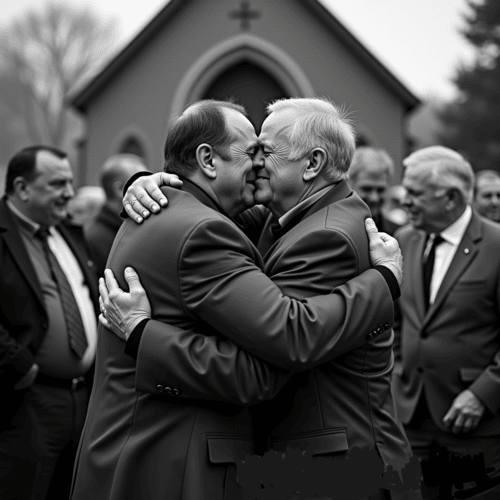When God Commands the ‘Impossible’—To Love Our Enemies
“But I tell you, love your enemies and pray for those who persecute you” (Matthew 5:44). These words of Jesus remain among His most challenging commands—and for good reason. In our natural state, loving those who harm us seems not just difficult, but downright impossible. And that’s precisely the point.
The call to love our enemies is one of the Bible’s most distinctive teachings, setting it apart from worldly wisdom. Yet the command comes with both a sobering warning and a gracious promise. Remember Jesus’ weighty words in the prayer He taught us (Matthew 6:12-15).
Here’s the beautiful truth: While loving our enemies lies beyond our natural capabilities, we’re not expected to accomplish this in our own strength. The same God who commands us to love our enemies promises to enable us through His Spirit. As Paul reminds us, “God’s love has been poured out into our hearts through the Holy Spirit” (Romans 5:5). This divine enablement makes possible what human nature declares impossible.
Loving Our Enemies—Understanding the Revolutionary Context
When Jesus commanded His followers to love their enemies, He wasn’t merely suggesting a better way to live—He was announcing a revolutionary ethic that would turn the world upside down. In first-century Palestine, the prevailing wisdom followed the “eye for an eye” principle, often interpreted as justification for personal vengeance rather than its original intent as a limit on retaliation.
The Jewish people, living under Roman occupation, were well-acquainted with enemies. Many eagerly anticipated a Messiah who would overthrow their oppressors. Instead, Jesus called them to love these very enemies. This wasn’t just counter-cultural; it was counter-intuitive.
Jesus’ words in Matthew 5:43-45 elevate love of enemies from an impossible ideal to a mark of authentic Christian discipleship.
What Love For The Enemy Is Not
Before exploring what it means to love our enemies, let’s clear up some common misconceptions:
- It’s Not Passive Acceptance of Evil: Jesus’ command to love our enemies doesn’t require us to pretend evil doesn’t exist or that wrongdoing doesn’t matter. When Jesus cleansed the temple (John 2:13-17), He demonstrated love can coexist with righteous opposition to wrong.
- It’s Not Denying Justice: Biblical love doesn’t negate justice. Paul affirms in Romans 13 God establishes governing authorities as His servants to carry out justice. Loving our enemies doesn’t mean we shouldn’t seek proper legal recourse when appropriate.
- It’s Not Enabling Abuse: Love doesn’t require us to remain in harmful situations. Setting appropriate boundaries and seeking safety are entirely compatible with loving our enemies from a distance.
- It’s Not Pretending Hurt Doesn’t Exist: Jesus never asked us to deny our pain or pretend we weren’t wounded. The Psalms demonstrate that we can be honest about our hurt while choosing to respond in love.
What If I Refuse to Forgive?
The consequences of refusing to forgive are sobering. Jesus tells a powerful parable in Matthew 18:21-35 about an unforgiving servant who, after being forgiven an enormous debt, refuses to forgive a much smaller debt owed to him. The result? He forfeits his own forgiveness and faces severe judgment.
When we refuse to forgive, we:
- Block Our Own Forgiveness: Jesus is unequivocal: (Matthew 6:15). This isn’t because God is petty, but because an unforgiving spirit reveals we haven’t truly grasped the gospel.
- Become Imprisoned by Bitterness: Refusing to forgive is like drinking poison and expecting the other person to die. Hebrews 12:15 warns bitterness is a root that grows up to cause trouble and defile many.
- Misrepresent Christ: As Christians, we’re called to be ambassadors of reconciliation (2 Corinthians 5:20). When we refuse to forgive, we contradict the very message we’re meant to embody.
- Deny Our Own Need for Mercy: The parable of the unforgiving servant reminds us we’ve been forgiven an incalculable debt by God. Refusing to forgive others suggests we’ve forgotten the magnitude of God’s mercy toward us.
Loving Our Enemies—Practical Steps
- Begin with Prayer: Prayer isn’t just a good suggestion—it’s where love for the enemy begins. Jesus specifically commands us to “pray for those who persecute you” (Matthew 5:44). This prayer changes them and us.
- Choose Blessing Over Cursing: Romans 12:14 tells us we’re to speak well of our enemies to others, do good to them when opportunity arises, and refuse to participate in gossip or slander.
- Seek Understanding: While not excusing wrong behaviour, try to understand the other person’s perspective. Often, hurt people hurt people. Understanding this can foster compassion.
Conclusion: The Ultimate Purpose
When we love our enemies, we reflect God’s character in a unique and powerful way. Jesus reminds us God “causes his sun to rise on the evil and the good, and sends rain on the righteous and the unrighteous” (Matthew 5:45).
Moreover, we demonstrate the gospel’s power. Paul reminds us that “while we were God’s enemies, we were reconciled to him through the death of his Son” (Romans 5:10). When we love our enemies, we put the gospel on display.
So loving our enemies isn’t optional for Christians—it’s a fundamental mark of authentic faith. While impossible in our own strength, God’s Spirit enables us to love as He loves. The choice remains ours: Will we accept the challenge and embrace the divine enablement to love our enemies?
As we do, we shall begin to discover loving our enemy isn’t just about changing our opponents—it’s about being transformed into the image of Christ, who loved us when we were His enemies.
“Do not be overcome by evil, but overcome evil with good” (Romans 12:21).
Loving Our Enemies—Related FAQs
What if I’m partly responsible for someone becoming my enemy? When we’ve contributed to a broken relationship, acknowledging our role becomes an essential first step in enemy love. Let’s begin by confessing our part to God and, where possible and appropriate, make a sincere apology to the person we’ve wronged—but remember their response to our apology is their choice, not our responsibility. Remember God’s command to love our enemies doesn’t exclude situations where we share blame; in fact, our own culpability should deepen our empathy and humility as we remember how Christ loved us even when we were in the wrong (Romans 5:8).
- How did Joseph demonstrate love for the enemy in his response toward his brothers? Joseph’s response to his brothers in Genesis 45 provides a masterclass in enemy love. Despite being sold into slavery by them, he chose to see God’s sovereign plan at work rather than focusing on their evil intent. When given the chance for revenge, he instead offered forgiveness, provision, and reconciliation, demonstrating that enemy love often requires us to look beyond the immediate hurt to see God’s bigger picture.
- What can we learn from David’s treatment of Saul? David’s response to Saul’s persecution shows us how to honour authority while maintaining healthy boundaries. Even when given opportunities to kill Saul (1 Samuel 24), David refused, demonstrating respect for God’s anointed while still taking practical steps to protect himself. This teaches us loving our enemies doesn’t mean becoming passive victims—we can maintain appropriate boundaries while still showing respect and refusing to take revenge.
- How does Jesus’ example on the cross guide us? Jesus’ prayer “Father, forgive them, for they know not what they do” (Luke 23:34) sets the ultimate standard for enemy love. Even in His moment of greatest suffering, Jesus chose forgiveness over vengeance and intercession over condemnation. This shows us true love for the enemy isn’t dependent on our circumstances or the other person’s worthiness, but on our choice to reflect God’s character even in extreme situations.
How does loving enemies transform us personally? When we choose to love our enemies, we experience inner freedom from bitterness and resentment. The act of praying for those who hurt us gradually transforms our hearts, aligning them more closely with God’s heart. This transformation often leads to unexpected peace and joy, proving that enemy love benefits the lover as much as the loved.
- What impact does love for the enemy have on our community? Love for the enemy breaks cycles of retaliation and creates opportunities for genuine reconciliation. When one person chooses love over hate, it can inspire others to do the same, creating a ripple effect in families, churches, and communities. Historical examples like Martin Luther King Jr.’s nonviolent resistance demonstrate how love for the enemy can transform entire societies.
- Can you share modern examples of the power of love for one’s enemy? The Amish community’s response to the 2006 Nickel Mines school shooting stands as a powerful modern example, where they chose forgiveness and even supported the shooter’s family. Rwanda’s post-genocide reconciliation efforts show how enemy love can heal even the deepest societal wounds. These examples demonstrate that enemy love isn’t just theoretical – it has practical power to transform real-world situations.
- What should I do when my enemy keeps attacking me? Persistent attacks require a balanced approach of wisdom and love. Set clear boundaries to protect yourself while maintaining a heart of prayer and compassion for your attacker. Remember you can love someone from a safe distance: seeking protection or legal recourse when necessary doesn’t contradict biblical love.
How do I handle forgiveness when it feels impossible? Begin by acknowledging your feelings honestly before God and remember forgiveness is often a process rather than a one-time event. Focus initially on small steps, like praying for the capacity to forgive, and remember that God’s grace empowers us to do what feels impossible. Consider seeking pastoral counsel or Christian therapy if you’re struggling with particularly deep wounds.
- What if reconciliation isn’t possible or safe? Forgiveness and reconciliation are different things—while we’re always called to forgive, reconciliation requires both parties’ participation and may not always be wise or possible. We can release someone to God’s justice while maintaining healthy distance and boundaries. Remember loving our enemy doesn’t always mean restoring the relationship to its previous state.
How do I demonstrate love for the enemy in personal relationships? Focus on practical acts of kindness while maintaining appropriate boundaries. Choose not to speak ill of them to others, pray for their welfare, and look for small ways to show Christ’s love without compromising your well-being. Remember that consistency in small acts of love often has more impact than grand gestures.
Loving Our Enemies—Our Related Posts
Editor's Pick

The Christian Sabbath: Why Did Sunday Replace Saturday?
Consider this: God-fearing Jews who’d faithfully observed Saturday Sabbath for over a thousand years suddenly began gathering for worship on [...]

Did the Early Christians Worship Jesus? The Biblical Evidence
It was a startling transformation: Jewish fishermen who'd spent three years following this itinerant carpenter from Nazareth now begin to [...]

If Jesus is Messiah, Why Aren’t ALL Messianic Prophecies Fulfilled?
If Jesus is truly the Messiah, why hasn't world peace arrived? Why do Jews still face persecution? Why isn't the [...]

When Courage Fails: Will I Be Forgiven If I Deny Christ in Persecution?
The rooster crowed, and Peter remembered. In that devastating moment, the apostle realised he’d just done the unthinkable—three times he’d [...]

What Makes a Godly Dad? 5 Biblical Principles Fathers Need
Modern culture sends fathers mixed messages. Be strong but sensitive. Be involved but not overbearing. Lead but don’t dominate. With [...]

What Makes a Godly Mom? A Scripture-Backed Guide
In our culture’s confusion about gender roles and parenting, the timeless question remains: what makes a godly mother? While secular [...]

Paul’s Mandate for Men: Headship Or Servant Leadership? Or Both?
Modern Christianity has fallen into a trap. We've created an either/or battle between "headship" and "servant leadership," as if these [...]

Should We Stop Using Male Pronouns for God? Why Do We Say No?
A friend of ours arrived eagerly at his first theology class in seminary. But he quickly discovered something troubling: the [...]

Did Old Testament Law Force Women to Marry their Rapists?
**Editor’s Note: This post is part of our series, ‘Satan’s Lies: Common Deceptions in the Church Today’… Viral misinformation abounds [...]

From Danvers To Nashville: Two Statements, One Biblical Vision
30 years separate the Danvers Statement on Biblical Manhood and Womanhood (1987) and the Nashville Statement on Human Sexuality (2017). [...]
SUPPORT US:
Feel the Holy Spirit's gentle nudge to partner with us?
Donate Online:
Account Name: TRUTHS TO DIE FOR FOUNDATION
Account Number: 10243565459
Bank IFSC: IDFB0043391
Bank Name: IDFC FIRST BANK






